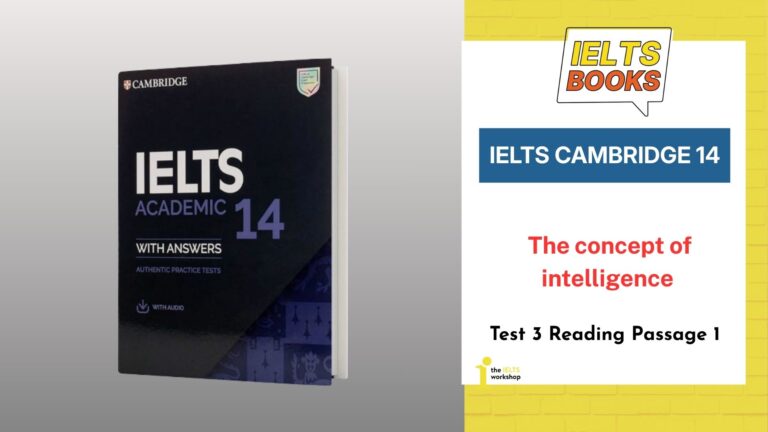Bài viết cung cấp đáp án, bản dịch và phân tích chi tiết IELTS Cambridge 14 Test 3 Reading Passage 1: The concept of intelligence. Hy vọng rằng chúng mình có thể đồng hành cùng bạn trên chặng đường chinh phục band điểm IELTS mơ ước của mình.
Đáp án IELTS Cambridge 14 Test 3 Reading Passage 1
| Câu hỏi | Đáp án |
|---|---|
| 1 | B |
| 2 | A |
| 3 | D |
| 4 | NOT GIVEN |
| 5 | NO |
| 6 | YES |
| 7 | B |
| 8 | C |
| 9 | B |
| 10 | A |
| 11 | A |
| 12 | C |
| 13 | A |
Phân tích chi tiết IELTS Cambridge 14 Test 3 Reading Passage 1
Question 1. B
Câu hỏi: Information about how non-scientists’ assumptions about intelligence influence their behaviour towards others. (Thông tin về cách các giả định của người không phải nhà khoa học ảnh hưởng đến hành vi của họ với người khác)
Vị trí: Đoạn B.
Transcript: First, implicit theories of intelligence drive the way in which people perceive and evaluate their own intelligence and that of others. To better understand the judgments people make about their own and others’ abilities, it is useful to learn about people’s implicit theories. For example, parents’ implicit theories of their children’s language development will determine at what ages they will be willing to make various corrections in their children’s speech.
Phân tích: Đoạn văn nhấn mạnh rằng các bậc cha mẹ (non-scientists) sử dụng những lý thuyết ngầm để đánh giá sự phát triển ngôn ngữ và năng lực trí tuệ của con mình ở các độ tuổi khác nhau. Do đó, nhận định về việc cha mẹ có thể dựa vào lý thuyết ngầm để quyết định thời điểm thích hợp cho các nhiệm vụ nhận thức là chính xác.
Question 2. A
Câu hỏi: A reference to lack of clarity over the definition of intelligence. (Thông tin đề cập đến việc định nghĩa trí thông minh chưa rõ ràng)
Vị trí: Đoạn A.
Transcript: Looked at in one way, everyone knows what intelligence is; looked at in another way, no one does. In other words, people all have unconscious notions – known as ‘implicit theories’ – of intelligence, but no one knows for certain what it actually is. This chapter addresses how people conceptualize intelligence, whatever it may actually be.
Phân tích: Trong phần này, tác giả khẳng định mọi người đều có khái niệm mơ hồ (implicit theories) về trí thông minh, nhưng lại không có một định nghĩa rõ ràng, thống nhất nào. Vì thế, ý tưởng rằng “ai cũng nghĩ mình hiểu trí thông minh, nhưng thực tế lại không ai chắc chắn về nó” là chính xác.
Question 3. D
Câu hỏi: The point that a researcher’s implicit and explicit theories may be very different. (Quan điểm cho rằng lý thuyết ngầm và lý thuyết rõ ràng của nhà nghiên cứu có thể khác biệt đáng kể)
Vị trí: Đoạn D.
Transcript: If an investigation of implicit theories reveals little correspondence between the extant implicit and explicit theories, the implicit theories may be wrong.
Phân tích: Đoạn văn đề cập đến trường hợp các nhà nghiên cứu nghi ngờ rằng lý thuyết hiện tại có thể sai hoặc gây hiểu lầm, nên việc xem xét lý thuyết ngầm là cần thiết. Điều này cho thấy sự chênh lệch giữa lý thuyết rõ ràng và lý thuyết ngầm có thể là dấu hiệu cho thấy vấn đề nằm ở một trong hai hoặc cả hai phía.
Question 4. NOT GIVEN
Câu hỏi: Slow language development in children is likely to prove disappointing to their parents. (Việc trẻ chậm phát triển ngôn ngữ có thể khiến cha mẹ thất vọng)
Vị trí: Đoạn B.
Transcript: For example, parents’ implicit theories of their children’s language development will determine at what ages they will be willing to make various corrections in their children’s speech.
Phân tích: Trong bài không có chi tiết nào đề cập đến việc sự phát triển ngôn ngữ chậm ảnh hưởng ra sao đến quan điểm của cha mẹ. Không có bằng chứng nào hỗ trợ hoặc phủ nhận ý kiến này.
Question 5. NO
Câu hỏi: People’s expectations of what children should gain from education are universal. (Kỳ vọng của mọi người về giáo dục trẻ em là giống nhau trên toàn thế giới)
Vị trí: Đoạn E.
Transcript: For example, expectations for children who participate in Western-style schooling are almost certain to be different from those for children who do not participate in such schooling.
Phân tích: Bài cho biết rằng kỳ vọng về khả năng trí tuệ của trẻ em khác nhau tùy theo độ tuổi, và một phần nguyên nhân là do ảnh hưởng của văn hóa. Điều này phản bác quan điểm rằng sự kỳ vọng không liên quan đến yếu tố văn hóa.
Question 6. YES
Câu hỏi: Scholars may discuss theories without fully understanding each other. (Các học giả có thể thảo luận lý thuyết mà không hoàn toàn hiểu nhau)
Vị trí: Đoạn J.
Transcript: Until scholars are able to discuss their implicit theories and thus their assumptions, they are likely to miss the point of what others are saying when discussing their explicit theories and their data.
Phân tích: Tác giả nói rõ rằng nếu các học giả không thảo luận các lý thuyết ngầm của họ, họ có thể không hiểu được luận điểm của người khác. Điều này khẳng định rằng sự thiếu đối thoại về giả định ngầm khiến họ dễ hiểu sai hoặc bỏ sót nội dung khi tranh luận.
Question 7. B
Câu hỏi: It is desirable for the same possibilities to be open to everyone. (Ai cũng nên có cơ hội ngang bằng nhau là điều đáng mong muốn)
Vị trí: Đoạn H.
Transcript: The Jeffersonian view is that people should have equal opportunities, but they do not necessarily avail themselves equally of these opportunities and are not necessarily equally rewarded for their accomplishments.
Phân tích: Jeffersonian cho rằng mọi người nên được trao cơ hội công bằng, phản ánh niềm tin vào bình đẳng về cơ hội – chứ không phải kết quả.
Question 8. C
Câu hỏi: No section of society should have preferential treatment at the expense of another. (Không nhóm xã hội nào nên được ưu tiên gây thiệt hại cho nhóm khác)
Vị trí: Đoạn I.
Transcript: In this view, we do not need or want any institutions that might lead to favoring one group over another.
Phân tích: Jacksonian tin rằng mọi người về cơ bản là bình đẳng và có thể thay thế nhau trong nhiều vị trí khác nhau, phản ánh sự tin tưởng vào sự đối xử công bằng, không thiên vị nhóm nào.
Question 9. B
Câu hỏi: People should only gain benefits on the basis of what they actually achieve. (Lợi ích nên được trao dựa trên thành tích thực tế)
Vị trí: Đoạn H.
Transcript: People are rewarded for what they accomplish, if given equal opportunity.
Phân tích: Quan điểm này nhấn mạnh rằng mỗi cá nhân chỉ được tưởng thưởng dựa trên thành quả thực sự họ đạt được, nếu có cơ hội bình đẳng – người đạt ít thì nhận ít, người đạt nhiều thì nhận nhiều.
Question 10. A
Câu hỏi: Variation in intelligence begins at birth. (Sự khác biệt về trí thông minh bắt đầu từ khi mới sinh)
Vị trí: Đoạn G.
Transcript: The Hamiltonian view, which is similar to the Platonic view, is that people are born with different levels of intelligence and that those who are less intelligent need the good offices of the more intelligent to keep them in line, whether they are called government officials or, in Plato’s term, philosopher-kings.
Phân tích: Hamiltonian cho rằng con người sinh ra đã có mức độ thông minh khác nhau, và người kém thông minh cần được người thông minh hơn dẫn dắt, tương tự cách Plato miêu tả “philosopher-kings”.
Question 11. A
Câu hỏi: The more intelligent people should be in positions of power. (Người thông minh hơn nên giữ vị trí lãnh đạo)
Vị trí: Đoạn G.
Transcript: Herrnstein and Murray (1994) seem to have shared this belief when they wrote about the emergence of a cognitive (high-IQ) elite, which eventually would have to take responsibility for the largely irresponsible masses of non-elite (low-IQ) people who cannot take care of themselves.
Phân tích: Herrnstein và Murray tin rằng một tầng lớp có chỉ số IQ cao sẽ dần trở thành lực lượng chủ chốt, chịu trách nhiệm cho phần đông dân số IQ thấp và không có khả năng tự quản lý bản thân.
Question 12. C
Câu hỏi: Everyone can develop the same abilities. (Mọi người đều có thể rèn luyện để có năng lực giống nhau)
Vị trí: Đoạn I.
Transcript: The Jacksonian view is that all people are equal, not only as human beings but in terms of their competencies – that one person would serve as well as another in government or on a jury or in almost any position of responsibility.
Phân tích: Jacksonian cho rằng mọi người đều có thể học các kỹ năng chuyên môn, và ngoài ra thì năng lực giữa họ là như nhau, nên có thể đảm nhiệm các vai trò tương đương trong xã hội.
Question 13. A
Phân tích: Đoạn cuối đoạn G nói rằng những người kém thông minh nếu tự vận hành sẽ gây nên tình trạng hỗn loạn, cho thấy quan điểm của Hamilton rằng họ cần được kiểm soát và hướng dẫn bởi người thông minh hơn.
Câu hỏi: People of low intelligence are likely to lead uncontrolled lives. (Người kém thông minh dễ sống không kiểm soát)
Vị trí: Đoạn G.
Transcript: Left to themselves, the unintelligent would create, as they always have created, a kind of chaos.
Bản dịch chi tiết IELTS Cambridge 14 Test 3 Reading Passage 1
A.
Looked at in one way, everyone knows what intelligence is; looked at in another way, no one does. In other words, people all have unconscious notions – known as ‘implicit theories’ – of intelligence, but no one knows for certain what it actually is. This chapter addresses how people conceptualize intelligence, whatever it may actually be. But why should we even care what people think intelligence is, as opposed only to valuing whatever it actually is? There are at least four reasons people’s conceptions of intelligence matter.
(Thoạt nhìn, dường như ai cũng hiểu trí thông minh là gì, nhưng nếu suy xét kỹ hơn, thì không ai thực sự biết chính xác. Mỗi người đều có những nhận định tiềm ẩn – còn gọi là ‘lý thuyết ngầm’ – về trí thông minh, song chưa có định nghĩa nào là chuẩn xác. Chương này sẽ khám phá cách con người hình thành ý niệm về trí thông minh, bất kể bản chất thực sự của nó là gì. Vậy tại sao chúng ta lại quan tâm đến quan điểm của mọi người về trí thông minh, thay vì chỉ tập trung vào định nghĩa chính thức? Có ít nhất bốn lý do cho thấy cách mọi người hiểu về trí thông minh rất đáng lưu tâm.)
- notion: khái niệm, ý niệm
- conceptualize: diễn đạt hoặc hình dung một ý tưởng trong đầu
B.
First, implicit theories of intelligence drive the way in which people perceive and evaluate their own intelligence and that of others. To better understand the judgments people make about their own and others’ abilities, it is useful to learn about people’s implicit theories. For example, parents’ implicit theories of their children’s language development will determine at what ages they will be willing to make various corrections in their children’s speech. More generally, parents’ implicit theories of intelligence will determine at what ages they believe their children are ready to perform various cognitive tasks. Job interviewers will make hiring decisions on the basis of their implicit theories of intelligence. People will decide who to be friends with on the basis of such theories. In sum, knowledge about implicit theories of intelligence is important because this knowledge is so often used by people to make judgments in the course of their everyday lives.
(Trước hết, lý thuyết ngầm về trí thông minh ảnh hưởng đến cách con người tự đánh giá năng lực của bản thân và người khác. Để hiểu rõ hơn những quyết định mà con người đưa ra về khả năng, việc tìm hiểu các lý thuyết ngầm là rất cần thiết. Ví dụ, cha mẹ có thể dựa vào lý thuyết ngầm về sự phát triển ngôn ngữ để biết ở độ tuổi nào họ nên điều chỉnh lời nói của con. Tương tự, họ sẽ dự đoán khi nào con mình đủ khả năng thực hiện các nhiệm vụ đòi hỏi tư duy. Các nhà tuyển dụng cũng sẽ đánh giá ứng viên dựa trên cách họ hiểu trí thông minh. Ngay cả việc lựa chọn bạn bè cũng bị chi phối bởi những lý thuyết này. Tóm lại, hiểu được lý thuyết ngầm giúp ta giải mã nhiều đánh giá thường nhật trong cuộc sống.)
- perceive: nhận thức, nhìn nhận
- cognitive: liên quan đến nhận thức hoặc quá trình tư duy
C.
Second, the implicit theories of scientific investigators ultimately give rise to their explicit theories. Thus it is useful to find out what these implicit theories are. Implicit theories provide a framework that is useful in defining the general scope of a phenomenon – especially a not-well-understood phenomenon. These implicit theories can suggest what aspects of the phenomenon have been more or less attended to in previous investigations.
(Thứ hai, các nhà nghiên cứu khoa học thường bắt đầu với lý thuyết ngầm trước khi hình thành các lý thuyết chính thức. Việc tìm hiểu các nhận định ngầm này rất hữu ích vì chúng tạo nên nền móng cho việc xác định phạm vi của một hiện tượng, đặc biệt là những hiện tượng chưa được lý giải rõ ràng. Chúng còn giúp nhận biết những yếu tố nào đã được chú ý hoặc bị bỏ qua trong các nghiên cứu trước.)
- phenomenon: hiện tượng
- framework: khung lý thuyết, cấu trúc hỗ trợ để phát triển ý tưởng
D.
Third, implicit theories can be useful when an investigator suspects that existing explicit theories are wrong or misleading. If an investigation of implicit theories reveals little correspondence between the extant implicit and explicit theories, the implicit theories may be wrong. But the possibility also needs to be taken into account that the explicit theories are wrong and in need of correction or supplementation. For example, some implicit theories of intelligence suggest the need for expansion of some of our explicit theories of the construct.
(Thứ ba, lý thuyết ngầm cũng hữu ích trong trường hợp nhà nghiên cứu nghi ngờ các lý thuyết hiện hành đang bị sai lệch hoặc gây hiểu nhầm. Nếu phát hiện thấy hai loại lý thuyết – ngầm và rõ ràng – không liên hệ nhiều với nhau, rất có thể một trong hai đang sai. Tuy nhiên, ta cũng phải xem xét khả năng rằng chính lý thuyết chính thức cần được điều chỉnh hoặc mở rộng. Chẳng hạn, một số nhận định ngầm về trí thông minh chỉ ra rằng lý thuyết hiện tại cần được phát triển thêm để đầy đủ hơn.)
- correspondence: sự tương quan, phù hợp
- construct: khái niệm trừu tượng được hình thành từ nhiều yếu tố khác nhau
E.
Finally, understanding implicit theories of intelligence can help elucidate developmental and cross-cultural differences. As mentioned earlier, people have expectations for intellectual performances that differ for children of different ages. How these expectations differ is in part a function of culture. For example, expectations for children who participate in Western-style schooling are almost certain to be different from those for children who do not participate in such schooling.
(Cuối cùng, hiểu rõ lý thuyết ngầm sẽ giúp ta thấy rõ sự khác biệt trong phát triển nhận thức và văn hóa giữa các nhóm người. Như đã đề cập, kỳ vọng về khả năng trí tuệ của trẻ sẽ thay đổi tùy theo độ tuổi và điều này bị ảnh hưởng một phần bởi nền văn hóa. Ví dụ, trẻ em theo học ở phương Tây chắc chắn sẽ được kỳ vọng khác với những trẻ em không trải nghiệm mô hình giáo dục đó.)
- expectation: sự kỳ vọng
- function (of something): hệ quả của, chịu ảnh hưởng bởi
F.
I have suggested that there are three major implicit theories of how intelligence relates to society as a whole (Sternberg, 1997). These might be called Hamiltonian, Jeffersonian, and Jacksonian. These views are not based strictly, but rather, loosely, on the philosophies of Alexander Hamilton, Thomas Jefferson, and Andrew Jackson, three great statesmen in the history of the United States.
(Tôi đã đưa ra giả thuyết rằng có ba mô hình lý thuyết ngầm chính về cách trí thông minh gắn liền với xã hội nói chung (Sternberg, 1997). Ba cách tiếp cận đó được gọi là Hamilton, Jefferson và Jackson. Những cách nhìn này không hoàn toàn rập khuôn theo tư tưởng của ba nhân vật lịch sử nổi tiếng Alexander Hamilton, Thomas Jefferson và Andrew Jackson, mà chỉ được lấy cảm hứng một cách tương đối từ triết lý của họ.)
- loosely: một cách không chặt chẽ, không chính xác hoàn toàn
- philosophy: triết lý, quan điểm sống hoặc tư tưởng
G.
The Hamiltonian view, which is similar to the Platonic view, is that people are born with different levels of intelligence and that those who are less intelligent need the good offices of the more intelligent to keep them in line, whether they are called government officials or, in Plato’s term, philosopher-kings. Herrnstein and Murray (1994) seem to have shared this belief when they wrote about the emergence of a cognitive (high-IQ) elite, which eventually would have to take responsibility for the largely irresponsible masses of non-elite (low-IQ) people who cannot take care of themselves. Left to themselves, the unintelligent would create, as they always have created, a kind of chaos.
(Quan điểm của Hamilton, gần giống với quan điểm của Plato, cho rằng con người sinh ra đã có mức độ thông minh khác nhau. Những người kém thông minh hơn cần có sự hướng dẫn từ người giỏi hơn – những người có thể là quan chức nhà nước hoặc theo cách gọi của Plato là “vua – triết gia”. Herrnstein và Murray (1994) cũng có quan điểm tương tự khi họ đề cập đến một tầng lớp trí tuệ vượt trội (IQ cao) sẽ phải gánh trách nhiệm cho đại đa số người dân có trí tuệ thấp hơn và không thể tự lo cho bản thân. Nếu bị bỏ mặc, những người này sẽ tạo ra sự rối loạn – như đã từng xảy ra trong lịch sử.)
- elite: tầng lớp tinh hoa, ưu tú
- irresponsible: thiếu trách nhiệm, không đáng tin cậy
H.
The Jeffersonian view is that people should have equal opportunities, but they do not necessarily avail themselves equally of these opportunities and are not necessarily equally rewarded for their accomplishments. People are rewarded for what they accomplish, if given equal opportunity. Low achievers are not rewarded to the same extent as high achievers. In the Jeffersonian view, the goal of education is not to favor or foster an elite, as in the Hamiltonian tradition, but rather to allow children the opportunities to make full use of the skills they have. My own views are similar to these (Sternberg, 1997).
(Theo quan điểm Jefferson, mọi người nên được trao cơ hội công bằng, nhưng không phải ai cũng sử dụng cơ hội đó như nhau, và phần thưởng dành cho họ cũng không giống nhau. Người có thành tích thấp sẽ không được tưởng thưởng ở mức ngang bằng với người thành tích cao. Quan điểm này cho rằng mục tiêu của giáo dục không phải là tạo điều kiện để hình thành một nhóm tinh hoa như trong truyền thống Hamilton, mà là giúp trẻ em phát huy tối đa khả năng vốn có. Cá nhân tôi cũng có cách nhìn tương tự (Sternberg, 1997).)
- accomplishment: thành tựu đạt được sau nỗ lực
- extent: mức độ, phạm vi
I.
The Jacksonian view is that all people are equal, not only as human beings but in terms of their competencies – that one person would serve as well as another in government or on a jury or in almost any position of responsibility. In this view of democracy, people are essentially inter substitutable except for specialized skills, all of which can be learned. In this view, we do not need or want any institutions that might lead to favoring one group over another.over another.
(Jackson cho rằng mọi người đều bình đẳng, không chỉ về mặt con người mà còn ở năng lực – nghĩa là ai cũng có thể đảm nhận vai trò như nhau trong chính phủ, tòa án hay các vị trí trách nhiệm khác. Theo lối tư duy dân chủ này, con người nhìn chung có thể thay thế nhau, trừ các kỹ năng chuyên môn – những thứ hoàn toàn có thể học được. Vì vậy, theo quan điểm này, ta không cần thiết lập những tổ chức có thể dẫn đến sự thiên vị giữa các nhóm người.)
- inter substitutable: có thể thay thế cho nhau trong cùng một vai trò
- specialized: chuyên biệt, đòi hỏi kỹ năng cụ thể
J.
Implicit theories of intelligence and of the relationship of intelligence to society perhaps need to be considered more carefully than they have been because they often serve as underlying presuppositions for explicit theories and even experimental designs that are then taken as scientific contributions. Until scholars are able to discuss their implicit theories and thus their assumptions, they are likely to miss the point of what others are saying when discussing their explicit theories and their data.
(Các lý thuyết ngầm về trí thông minh và mối quan hệ của nó với xã hội cần được cân nhắc kỹ lưỡng hơn, bởi vì chúng thường là nền tảng tiềm ẩn cho những lý thuyết rõ ràng hoặc các thiết kế nghiên cứu được coi là mang tính khoa học. Khi các học giả chưa thảo luận công khai về các giả định ngầm của mình, họ rất dễ bỏ lỡ thông điệp mà người khác muốn truyền đạt khi nói về lý thuyết hoặc dữ liệu nghiên cứu của họ.)
- assumption: giả định, điều giả thiết
- presupposition: giả định nền tảng, điều được chấp nhận là đúng trước khi có bằng chứng
Series giải đề IELTS Cambridge 14
- [PDF+Audio] Sách IELTS Cambridge 14 (bản đẹp)
- Giải chi tiết Cambridge 14 Test 3 Listening Part 1: Flanders Conference Hotel
- Giải chi tiết Cambridge 14 Test 3 Listening Part 2: Volunteers
- Giải chi tiết Cambridge 14 Test 3 Listening Part 3: Background on school marching band
- Giải chi tiết Cambridge 14 Test 3 Listening Part 4: Concerts in university arts festival
- Giải chi tiết Cambridge 14 Test 3 Reading Passage 1: The concept of intelligence
- Giải chi tiết Cambridge 14 Test 3 Reading Passage 2:Back to the future of skyscraper design
- Giải chi tiết Cambridge 14 Test 3 Reading Passage 3: The power of play
- [PDF + Audio] Trọn bộ Cambridge Practice Tests For IELTS 1 – 20 mới nhất
Nếu bạn đang tìm kiếm một lộ trình học bài bản, phương pháp rõ ràng và sự đồng hành từ những giáo viên giàu kinh nghiệm, The IELTS Workshop chính là nơi bạn có thể tin tưởng.
Khám phá khóa học IELTS miễn phí tại Website The IELTS Workshop để được trải nghiệm phương pháp học hiện đại, lộ trình cá nhân hóa cùng đội ngũ giáo viên chuyên môn cao ngay nhé!



![[PDF + Audio] Trọn bộ Cambridge Practice Tests For IELTS 1 – 20 mới nhất](https://onthiielts.com.vn/wp-content/uploads/2020/04/cam-1-14-764x400.jpg)
![[PDF + Audio] Cambridge IELTS 20: Cập nhật mới nhất (Bản đẹp)](https://onthiielts.com.vn/wp-content/uploads/2025/07/Cambridge-IELTS-20-300x169.jpg)




